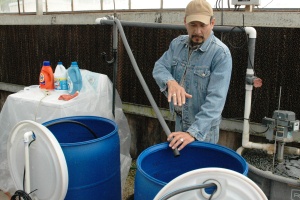Beginning on Saturday, April 20 and lasting through Sunday, Tennessee State Parks will be sponsoring free, guided hikes at each state park as a way to celebrate Earth Day this year.
Because food scarcity is a growing concern across the world, researchers have studies millet grain as a large agricultural contributor due to the grain’s resilience to drought, water scarcity, and the ever-changing climate.
Since methane is more harmful than CO2 and is very influential in climate change, researchers have found a new way to capture the greenhouse gas.
Released by the Bureau of Safety and Environmental Enforcement last week, the final rule will take effect June 4 and expands on the initial Safety and Environmental Management Systems rule issued in October 2010.
The Energy Department will be investing $15.8 million over the next five years on a new dry storage research and development project that should result in safe and secure storage of used nuclear fuel.
American Rivers’ annual list of America’s Most Endangered Rivers has been released today, naming the Colorado River as the most endangered river in the country.
At Walmart’s Global Sustainability Milestone Meeting, it was announced that the company plans to be completely supplied by renewable energy by the end of 2020.
The new Steamate Low Salt Amine (LSA) by GE provides a cost-effective and innovative solution for refinery boilers and steam systems that is process compatible.
Earlier today, the EPA released the 18th annual report of U.S. greenhouse gas emissions, which shows that emissions decreased by 1.6 percent in 2011 from 2010.
The National Renewable Energy Laboratory (NREL) has hired three new people to lead their Bioenergy, Bioscience, and Energy Systems Integration Facility.
The EPA, Navajo Nation, other federal agencies, and organization will be having a meeting on April 16-17 in order to address the uranium contamination on the Navajo Nation.
After a New Hampshire court ruling stated that ExxonMobil supplied over 2 billion gallons of MTBE gasoline that resulted in contaminating the state’s drinking water and causing $816 million in damages. As a result, ExxonMobil has been fined more than $236 million.

Research on gray water use for home irrigation has been getting positive initial results.
A Spanish poultry processing firm will be upgrading its wastewater treatment plant with GE LEAPmbr Membrane Bioreactor Technology, which will double the water treatment capacity within the same footprint of the existing wastewater plant and will improve the quality of water that is discharged to comply with regulations.
In a meeting at the American Chemical Society, it was revealed that high levels of lead have been found in rice that’s been imported to the U.S. from certain countries. According to their research, baby food contained some of the highest levels of lead.
According to the Energy Information Administrations (EIA), CO2 emissions have managed to decrease each year since 2007, and 2012 had the lowest emissions since 1994.
In order to restore two Sierra Nevada meadows, the Sierra Nevada Conservancy will be sending $137,000 grant to American Rivers.
"What we found is that floods have the potential to affect just about everyone who lives in California," said Kim Carsell, the U.S. Army Corps of Engineers' lead planner for the assessment.
On April 21, Target will be giving away 1.5 million reusable bags to their customers as a way to celebrate Earth Day.
Canadian citizens oppose Ontario Power Generation’s plan to bury radioactive nuclear waste approximately 1,300 feet from Lake Huron.